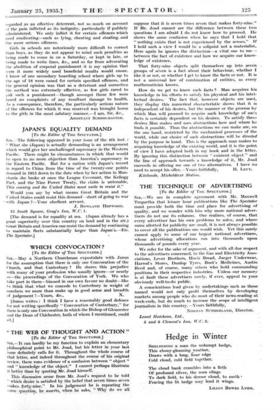" THE WEB OF THOUGHT AND ACTION "
[To the Editor of THE SPECTATOR.]
Sia,—It can hardly be my function to explain an elementary philosophical point to Mr. Joad, but his letter in your last issue definitely calls for it. Throughout the whole course of that letter, and indeed throughout the course of his original review, there runs evidence of a confusion between " object " and " knowledge of the object." I cannot perhaps illustrate it better than by quoting Mr. Joad himself.
This discussion arose from Mr. Joad's request to be told
which desire is satisfied by the belief that seven times seven makes. forty-nine." In his judgement he is repeating the same question, he asserts, when he asks, " Why do we all
suppose that it is seven times seven that makes forty-nine." If Mr. Joad cannot see the difference. between these two questions I am Afraid I -du not know how to proceed. He shows the same confusion when he says that I hold that " nothing exists that is not experienced by the senses." If I held such a view I would be a solipsist not a materialist. Here again he ignores the distinction—a vital one to me— between the fact of existence and how we acquire our know- ledge of existence.
That forty-nine objects split themselves up into - seven groups of seven is a fact about their behaviour, whether I like it or not, or whether I get to know the facts or not. It is not a universal law of combination of entities, as every mathematician knows.
How do we get to know such facts 2- Man acquires his knowledge in his efforts to satisfy his physical and his intel- lectual desires: The fact that, however objects are used, they display this numerical characteristic shows that it is independent of his desires, but the manner or the process by which Man will proceed to acquire such knowledge of suet facts is certainly dependent on his desires. To satisfy these desires Man makes and uses abstractions how and where he finds it possible. Thus the abstractions we can make are, on the one hand, restricted by the mechanical processes of the world, while our choice. of such abstractions will be directed by the purpose in hand. This is the approach man makes to acquiring knowledge of the existing world, and it is the point of view I have adopted both in my book and in the letter. By ignoring this distinction between " existent object " and the line of approach towards a knowledge of it, Mr. Joad succeeds in offering me one of two alternatives. I have no need to accept his offer.—Yours faithfully, H. LEVY. Kitelands, Micheldever Station.














































 Previous page
Previous page